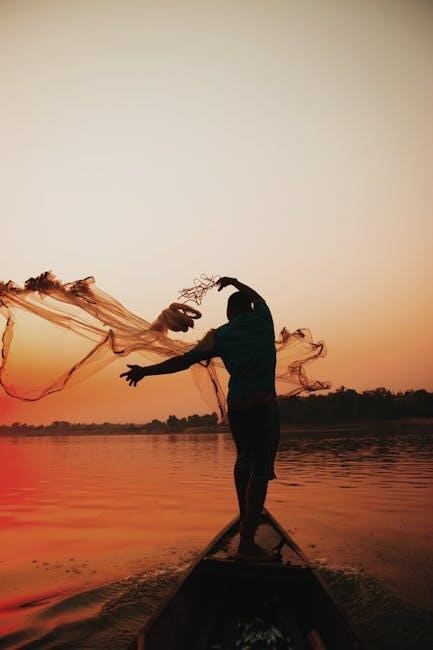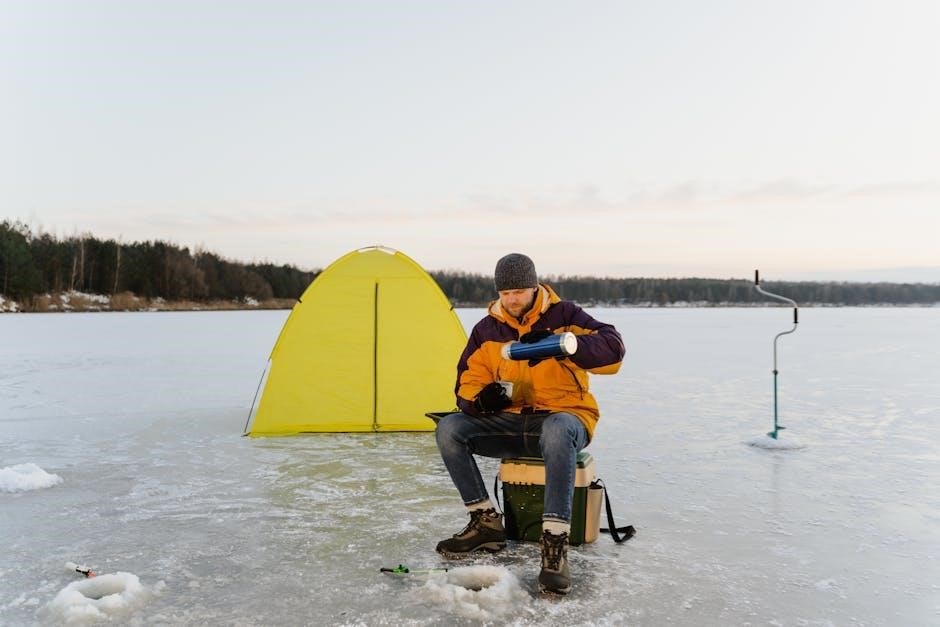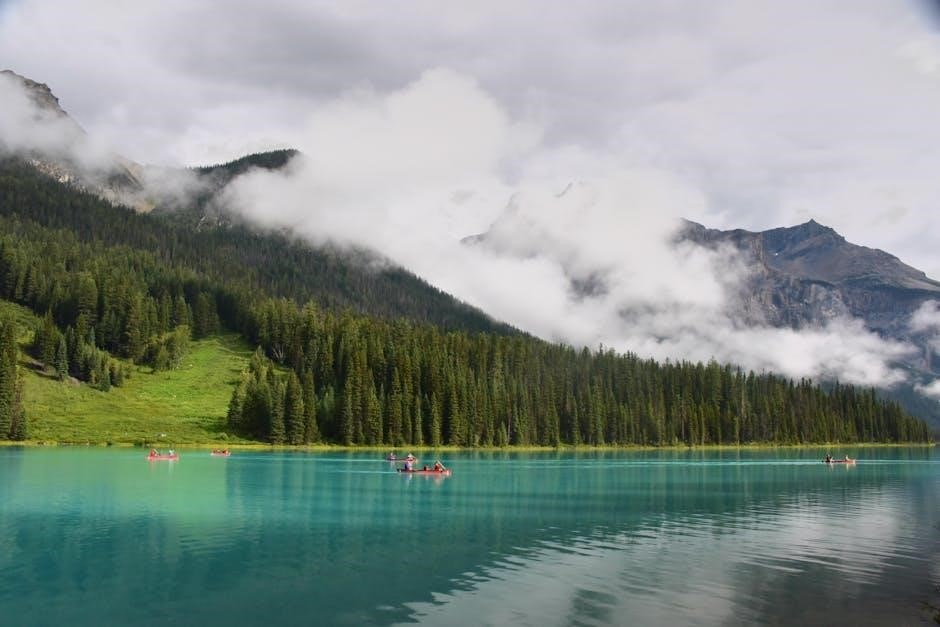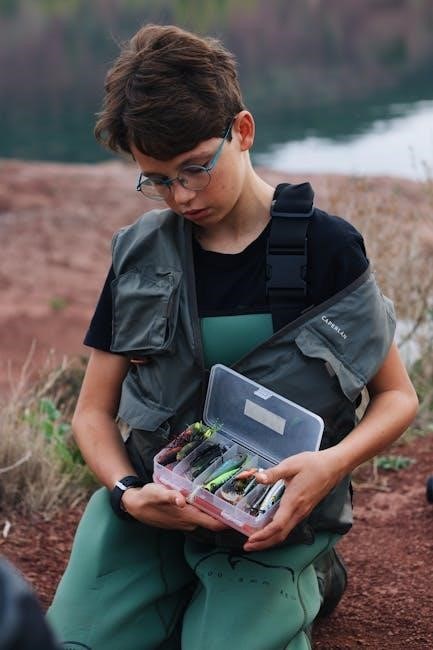Douglas Lake, spanning 30,600 acres with 555 miles of shoreline, offers exceptional fishing opportunities. Known for its clear waters, it attracts anglers targeting black bass and white bass. A fishing guide provides local expertise, maximizing your fishing experience with insights into prime spots and techniques, ensuring a memorable adventure on the water.
1.1 Overview of Douglas Lake
Douglas Lake, a 30,600-acre Tennessee Valley Authority reservoir, boasts 555 miles of shoreline. Known for its clear waters, it is a premier fishing destination, attracting anglers seeking black bass, white bass, and other species. Its fertile ecosystem and diverse structure create ideal habitats for fish, making it a hotspot for both recreational and competitive fishing enthusiasts year-round.
1.2 Importance of a Fishing Guide
A fishing guide is essential for navigating Douglas Lake’s diverse ecosystems and maximizing your catch. Local experts provide invaluable insights into prime fishing spots, seasonal patterns, and effective techniques. Their knowledge ensures a successful and enjoyable trip, helping anglers of all skill levels make the most of their time on the water while adhering to local regulations and safety practices.
Popular Fish Species in Douglas Lake
Douglas Lake is renowned for its abundant fish species, including black bass, white bass, and others. Its clear waters and diverse habitats make it a prime fishing destination, attracting anglers seeking thrilling catches and memorable experiences.
2.1 Black Bass (Largemouth and Smallmouth)
Douglas Lake is renowned for its abundant black bass population, including both largemouth and smallmouth varieties. The lake’s clear waters and diverse structure, such as rock beds and coves, provide an ideal habitat. Anglers frequently target these areas, and the lake’s fertile environment supports healthy fish growth, making it a prime destination for bass fishing enthusiasts seeking challenging and rewarding experiences.
2.2 White Bass
White bass are abundant in Douglas Lake, offering exciting opportunities for anglers. These fish often school in open waters, feeding on shad and baitfish. Anglers typically use jigs, spoons, and crankbaits to target them. The lake’s clear waters and diverse structure make it an ideal location for white bass fishing, attracting both experienced anglers and newcomers seeking to land these energetic fighters.
2.3 Other Species Found in the Lake
Douglas Lake is home to a variety of fish species beyond bass. Crappie, both white and black, are plentiful and popular for their flavorful meat. Catfish, including channel and blue catfish, offer a strong fight. Walleye and sauger are also present, often targeted by anglers using specific techniques. The lake’s diverse ecosystem supports these species, making it a versatile fishing destination for anglers of all skill levels.
Best Times and Seasons for Fishing
Douglas Lake offers prime fishing year-round. Spring and fall are ideal for black bass, while summer evenings are perfect for white bass. Tournaments peak in summer and early fall, highlighting the lake’s productivity during these seasons.
3.1 Seasonal Fishing Patterns
Douglas Lake exhibits distinct seasonal fishing patterns. Spring brings black bass to shallow waters for spawning, while summer sees white bass active in open waters during evenings. Fall offers aggressive feeding from both species preparing for winter. Understanding these patterns is key to maximizing your catch, as fish behavior and habitats shift significantly with the seasons.
3.2 Optimal Fishing Hours
The best fishing hours on Douglas Lake are typically during early morning and late evening when fish are most active. Avoid midday when the sun is high, as fish retreat to deeper waters. Optimal times include dawn and dusk, with peak activity often occurring in the first two hours after sunrise and the last two before sunset. Weather changes can also trigger feeding activity, making these periods prime for casting.
Prime Fishing Locations on Douglas Lake
Douglas Lake’s prime fishing spots include rocky shores, weed beds, and drop-offs near boat docks. These areas attract black bass and white bass, offering productive casting opportunities.
4.1 Key Hotspots for Different Species
Douglas Lake’s rocky shores and weed beds are hotspots for black bass, while white bass thrive near schools of baitfish in open waters. Crappie and panfish frequent submerged logs and shallow coves, and catfish are often found in deeper, muddy areas near the dam. These locations provide ideal habitats for various species, making them prime targets for anglers seeking diverse catches.
4.2 Shoreline vs. Open Water Fishing
Douglas Lake offers diverse fishing experiences, with shorelines ideal for targeting black bass and crappie near rocky structures and weed beds. Open water fishing excels for species like white bass and catfish, often found near schools of baitfish. Shoreline fishing provides easier access for bank anglers, while open water requires a boat but offers deeper, less pressured areas to explore and cast lines effectively.

Fishing Techniques and Strategies
Common techniques include trolling, casting, and jigging. Use spinnerbaits for bass and spoons for white bass. Local experts recommend adjusting tackle based on water clarity and depth for optimal results.
5.1 Common Techniques Used
Anglers on Douglas Lake often employ trolling, casting, and jigging. Bottom fishing with live bait is effective for targeting species like black bass. Spinnerbaits and crankbaits are popular for their versatility, while spoons and minnows work well for white bass. Adjusting tackle and presentation based on water clarity and depth can significantly improve success rates. Local guides emphasize the importance of adapting techniques to seasonal changes and fish behavior.
5.2 Recommended Tackle and Gear
For Douglas Lake fishing, medium-light to medium-heavy action rods (6-7 ft) and reels with a good drag system are ideal. Use monofilament or fluorocarbon line (10-15 lb) for black bass and lighter setups (6-8 lb) for white bass. Live bait like minnows and soft plastics are effective, while spoons and crankbaits work well for deeper fish. Essential gear includes sharp hooks, assorted sinkers, and a variety of lures. Always carry a net and a first-aid kit.
Fishing Regulations and Safety Tips
Adhere to Tennessee’s fishing regulations, including bag limits and size restrictions. Always wear a life jacket and monitor weather conditions. Ensure proper gear maintenance and follow catch-and-release guidelines to preserve fish populations.
6.1 Local Fishing Regulations
Fishing on Douglas Lake requires adherence to Tennessee’s fishing regulations. Bag limits and size restrictions apply to species like black bass and white bass. Ensure proper licensing and familiarity with seasonal restrictions. Specific rules may vary, so consult the Tennessee Wildlife Resources Agency (TWRA) for the most accurate and updated information before your trip.
6.2 Safety Precautions on the Water
Always wear a U.S. Coast Guard-approved life jacket while on the water. Monitor weather conditions and avoid fishing during storms or strong winds. Carry a first aid kit and ensure all safety equipment is easily accessible. Inform someone of your fishing plans and expected return time. Be visible to other boats and follow all boating regulations for a safe experience.
Fishing Charter and Guide Services
Professional fishing charters and guides offer expert knowledge of Douglas Lake, ensuring anglers maximize their fishing experience with tailored trips and insider tips on prime locations.
7.1 Benefits of Hiring a Guide
Hiring a guide enhances your fishing experience by providing local expertise, access to prime spots, and tailored techniques. Guides offer insights into seasonal patterns, optimal fishing hours, and gear recommendations, maximizing your chances of a successful trip. Their knowledge ensures you make the most of your time on Douglas Lake, creating unforgettable memories.
7.2 Top-Rated Charters on Douglas Lake
Douglas Lake offers several top-rated fishing charters, providing expert guidance and exceptional fishing experiences. Charters like [Top Charter Name] are highly recommended, offering competitive rates starting at $90 per person. These services ensure a well-equipped and memorable trip, with verified reviews and secure online booking options. Expert captains guarantee a high success rate, making your fishing adventure both enjoyable and productive.

Tips for Catching Specific Fish
To catch black bass, focus on submerged structures with jigs or crankbaits. For white bass, use shiny spoons or spinners near schools in open water, especially during early mornings or late evenings. Slow to moderate retrieval works best.
8.1 Targeting Black Bass
Black bass thrive in Douglas Lake’s clear waters, often near submerged structures like rocks and logs. Use jigs or crankbaits to mimic baitfish, focusing on depths of 10-20 feet. Early morning and late evening are prime times. Slow, steady retrieval increases chances of a strike. Largemouth prefer heavier cover, while smallmouth favor rocky areas. Patience and precise casting yield success.
8.2 Effective Methods for White Bass
White bass in Douglas Lake are schooling fish, often found in open waters near baitfish. Use shiny spinners or spoons to mimic their prey. Live minnows or small jigs work well for attracting bites; Fish during early morning or late evening when they’re most active. Target areas with schooling baitfish, as white bass follow these groups. Stay patient and persistent, as they often strike in rapid succession once located.
Best Fishing Gear and Equipment
For Douglas Lake fishing, medium-light to medium-heavy rods and reels with 10-15 lb test line are ideal. Use lures like spinnerbaits, crankbaits, and jigs for bass. Ensure tackle is well-maintained for durability and success.
9.1 Recommended Rods and Reels
For Douglas Lake fishing, medium-light to medium-heavy action rods (6-7 feet) are ideal for black bass and white bass. Pair with spinning or baitcasting reels featuring smooth drag systems. Monofilament or fluorocarbon lines with 10-15 lb test are recommended for strength and sensitivity. Ensure tackle is balanced for optimal casting and fighting fish effectively in various lake conditions.
9.2 Lures and Baits for Success
For Douglas Lake, soft plastic lures like curly tail grubs and crankbaits are effective for black bass. White bass respond well to spoons and spinners. Live baits such as minnows and nightcrawlers also yield consistent results. Choose lures that mimic the lake’s natural baitfish, and adjust colors based on water clarity. Seasonal patterns may require switching between deep-diving and shallow-running lures for optimal success.
Understanding Lake Conditions
Douglas Lake’s water clarity varies, affecting fish behavior. Depth changes seasonally, with fish moving to cooler zones in summer. Weather impacts water temperature and visibility, influencing fishing success.
10.1 Water Clarity and Depth
Douglas Lake’s water clarity is a key factor for anglers, as it influences fish behavior and visibility. The lake’s depths vary, creating diverse habitats for fish. Clear waters allow for effective use of lures and natural bait presentation. Understanding depth variations helps target species like black bass, which often thrive in specific zones. Clarity and depth play crucial roles in successful fishing strategies.
10.2 Impact of Weather on Fishing
Weather significantly influences fishing success on Douglas Lake. Sunny days may drive fish deeper, while overcast skies can increase surface activity. Rainfall and wind can stir up the water, affecting visibility and fish behavior. Seasonal temperature changes also play a role, with warmer months boosting metabolism and activity. Monitoring weather patterns helps anglers adapt strategies for optimal results.

Fishing Tournaments and Events
Douglas Lake is a top destination for competitive fishing, hosting events like the FLW Bass Fishing League. These tournaments attract anglers nationwide, fostering community and excitement.
11.1 Local Fishing Competitions
Douglas Lake hosts various fishing competitions, including the FLW Bass Fishing League, attracting anglers from across the nation. These events showcase the lake’s renowned black bass and white bass populations, drawing both professionals and enthusiasts. Local tournaments often feature community involvement, fostering camaraderie and competitive spirit, while highlighting the lake’s reputation as a premier fishing destination with abundant opportunities for anglers of all skill levels.
11.2 Participating in Community Events
Community events at Douglas Lake foster connections among anglers and locals. Family-friendly fishing derbies and educational workshops are popular, promoting conservation and skill-sharing. These events often feature kid-friendly activities, making fishing accessible to all ages. Participating in such gatherings enhances the fishing experience while supporting local efforts to preserve the lake’s ecosystem for future generations to enjoy and appreciate Douglas Lake’s fishing heritage.
Fish Care and Conservation
Practicing catch-and-release and handling fish gently ensures sustainable fishing. Conservation efforts protect Douglas Lake’s ecosystem, promoting healthy fish populations and preserving the environment for future anglers to enjoy.
12.1 Catch-and-Release Practices
Catch-and-release fishing is vital for preserving Douglas Lake’s fish populations. Using barbless hooks and nets minimizes injury. Handle fish gently, avoiding prolonged exposure to air. Quickly release them into the water to ensure survival. This practice helps maintain the balance of the ecosystem, allowing future anglers to enjoy the lake’s abundant fishing opportunities and healthy fish stocks sustainably.
12.2 Conservation Efforts in the Area
Conservation efforts at Douglas Lake focus on preserving its ecosystem and fish populations. Initiatives include water quality monitoring, habitat restoration, and invasive species management. Local organizations partner with anglers to promote sustainable practices. Educational programs highlight the importance of conservation, ensuring the lake remains a thriving fishing destination for future generations while maintaining environmental balance and biodiversity.

Family-Friendly Fishing Spots
Douglas Lake offers family-friendly fishing spots with accessible locations, calm waters, and scenic views. These areas are perfect for introducing kids to fishing, ensuring a fun experience.
13.1 Accessible Locations for All Ages
Douglas Lake offers numerous accessible fishing spots suitable for families and anglers of all ages. Shallow waters near shorelines provide safe environments for children, while boat ramps ensure easy access for families with gear. Locations like Dandridge Dock and public parks feature amenities such as picnic areas and restrooms, making fishing trips enjoyable for everyone. These spots are perfect for teaching kids the basics of fishing in a relaxed setting.
13.2 Making Fishing Fun for Kids
Engage kids with simple, kid-friendly gear and exciting techniques. Use colorful lures and teach them about fish species to spark curiosity. Patience and encouragement are key to fostering a love for fishing. Consider small rewards for their catches and create games like spotting fish or identifying water creatures. These activities make fishing trips memorable and fun for the whole family.

Fishing Trip Planning and Logistics
Planning a fishing trip to Douglas Lake involves booking suitable accommodations, packing essential gear, and timing your visit according to seasonal fishing patterns for optimal success.
14.1 Booking Accommodations
When planning a fishing trip to Douglas Lake, booking the right accommodations is crucial. Choose from lakeside cabins, hotels, or RV parks, ensuring proximity to boat launches and amenities. Consider your group size and preferences for comfort. Many options offer easy access to fishing spots, and some provide gear storage. A fishing guide can also recommend top-rated stays, ensuring a seamless experience. Book early, especially during peak seasons.
14.2 Packing Essentials for a Day Trip
Pack essential fishing gear, including rods, reels, lures, and bait. Bring a first-aid kit, sunscreen, and a hat for sun protection. Carry a cooler with snacks, water, and ice for storing catches. Include a map or GPS for navigation, extra clothing, and a flashlight. Don’t forget a valid fishing license and a small toolkit for gear adjustments. A portable charger ensures devices stay powered throughout the day.
Common Mistakes to Avoid
Common mistakes include ignoring water conditions, using incorrect bait, and overcrowding popular spots. Avoid starting too late, as prime fishing times are often early morning. Overlooking local regulations and failing to adapt to changing weather can also reduce success rates.
15.1 Avoiding Common Fishing Errors
Common fishing errors on Douglas Lake include ignoring water clarity, using incorrect bait, and overcrowding popular spots. Many anglers overlook seasonal patterns, leading to poor results. Failing to adapt to weather changes, such as shifting winds or storms, can also hinder success. Additionally, neglecting to check tackle strength for larger species and not respecting catch limits are frequent mistakes that can ruin a fishing trip.
15.2 Learning from Local Experts
Learning from local experts is crucial for success on Douglas Lake. Guides offer insights into hidden hotspots, seasonal patterns, and effective techniques tailored to the lake’s unique conditions. Their knowledge of fish behavior, tackle selection, and weather impacts can significantly improve your catch rate. Engaging with experienced anglers or charter captains enhances your fishing trip, ensuring you make the most of your time on the water.
Douglas Lake offers exceptional fishing experiences, with its clear waters and diverse species. For a successful trip, refer to local guides, fishing reports, and conservation resources for up-to-date information and expert tips.
16.1 Final Tips for a Successful Trip
Plan thoroughly, considering seasonal patterns and water conditions. Use a trusted fishing guide for expert insights. Ensure your tackle is appropriate for target species. Observe local regulations and practice catch-and-release to conserve fish populations. Respect the environment and stay safe on the water. With preparation and awareness, your Douglas Lake fishing adventure will be both enjoyable and rewarding.
16.2 Additional Resources and Guides
For detailed insights, visit the Tennessee Wildlife Resources Agency website for fishing reports and regulations. Explore top-rated fishing charters and guides through platforms like Fishidy or local fishing forums. Check out interactive maps and fishing apps for real-time water conditions. Additionally, local tackle shops and marinas offer valuable advice and gear recommendations to enhance your fishing experience on Douglas Lake.
